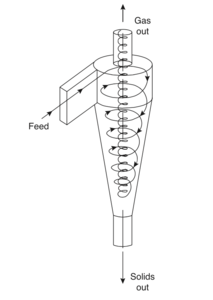Solids-involved equipment: Difference between revisions
| Line 14: | Line 14: | ||
As the name implies, gravity settlers are simply a long chamber through which gas-solid systems are sent. Large particle sizes (>50um) can be removed from the system this way. |
As the name implies, gravity settlers are simply a long chamber through which gas-solid systems are sent. Large particle sizes (>50um) can be removed from the system this way. |
||
===Cyclones=== |
===Cyclones=== |
||
When a gravity settler is insufficient, centrifugal separation can be employed. This piece of process equipment is known as a cyclone. A cyclone resembles an inverted cone, in which solid-gas systems enter along the side, and gas exits at the top. Solids then fall out the bottom. See figure 1 for more details. [[File:cyclone.png|thumb|center|'''Figure 1''' Standard Reverse-flow Cyclone| |
When a gravity settler is insufficient, centrifugal separation can be employed. This piece of process equipment is known as a cyclone. A cyclone resembles an inverted cone, in which solid-gas systems enter along the side, and gas exits at the top. Solids then fall out the bottom. See figure 1 for more details. [[File:cyclone.png|thumb|center|'''Figure 1''' Standard Reverse-flow Cyclone|500x300px]] |
||
=== |
=== |
||
Revision as of 12:16, 5 February 2016
Author: John Marsiglio [2016]
Stewards: Daniel Garcia and Fengqi You
Introduction and Overview
Solids-involed equipment is an important aspect of many processes. Solids are often more difficult to handle than liquids because the process equipment consumes more energy to operate, are more prone to mechanical failure, and can create dust. Dusts can be very dangerous. They can cause respiratory illnesses and in cases of combustible dust such as the Domino sugar plant, cause explosions in confined spaces. Flow of solids is also difficult to predict. While rheology is a well studided field for fluids, powder rheology is not a well characterized field. There are many pieces of process equipment aimed at handling solids. A bin is a vertical vessel used for storing solids. Large bins with with roughly a height to diameter ratio of 1.5 are called silos. Bins with height to diameter ratio less than this are called bunkers. From a silo or bunker solids will move out of an orrifcae, or hopper, to a feeder. Solids may be conveyed in a number of ways. The most familiar of these ways is a belt conveyer, like the ones used at the Domino sugar plant. There are also screw conveyors, which are used to convey free-flowing solids over short distances. Screw conveyors have been used since the time of archemides who made them famous with his archemedies screw. Other types include hydraulic and pneumatic conveyors.
Industrial Separation of Solids
Currently there are many different ways to separate solids from liquids or gases. The most industrially important pieces of equipment are used to separate solid particles from gasses. A sector of this field, known as air pollution control is often glossed over in most chemical engineering undergraduate courses. However, it is an extremely important topic in industrial chemical plant design for reasons of employee health and EPA guidlines. However, there are other reasons to separate solids from gases, such as to prevent buildup of combustible dusts, as in the instance of the Domino sugar factory explosion.
Gravity Settlers
As the name implies, gravity settlers are simply a long chamber through which gas-solid systems are sent. Large particle sizes (>50um) can be removed from the system this way.
Cyclones
When a gravity settler is insufficient, centrifugal separation can be employed. This piece of process equipment is known as a cyclone. A cyclone resembles an inverted cone, in which solid-gas systems enter along the side, and gas exits at the top. Solids then fall out the bottom. See figure 1 for more details.
